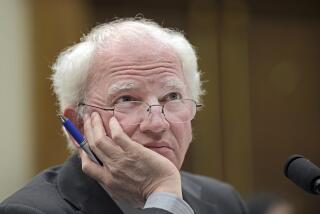Stephen Glass, ex-journalist who fabricated stories, can’t be lawyer
SAN FRANCISCO -- Stephen R. Glass, a former journalist who became infamous for fabricating magazine articles, may not practice law in California because he has failed to show sufficient rehabilitation, the state’s high court decided Monday.
In a unanimous, unsigned ruling, the California Supreme Court said Glass had demonstrated a pattern for deceit for which he has not adequately atoned.
Glass has failed to “establish that he engaged in truly exemplary conduct over an extended period,” the court said. “We conclude that on this record he has not sustained his heavy burden of demonstrating rehabilitation and fitness for the practice of law.”
Glass, 41, was in his 20s when he fabricated 42 articles for the New Republic, Rolling Stone and other magazines before being caught in 1998. A movie, “Shattered Glass,” was made about his exploits, and he wrote a novel based on them.
Glass obtained a law degree from Georgetown Law School and passed the bar examinations in New York and California, but questions about his moral character have prevented him from being licensed.
The California bar found him morally unfit in 2009, but he won an appeal after a confidential, 10-day trial in which colleagues, friends, employers and his psychiatrists testified. Bar examiners then asked the California Supreme Court to deny him a license.
“Our review of the record indicates hypocrisy and evasiveness in Glass’ testimony at the California State Bar hearing...,” the court said. “ We find it particularly disturbing that at the hearing, Glass persisted in claiming that he had made a good-faith effort to work with the magazines that published his works.
“He went through many verbal twists and turns at the hearing to avoid acknowledging the obvious fact that in his New York bar application he exaggerated his level of assistance to the magazines that had published his fabrications, and that he omitted from his New York bar list of fabrications some that actually could have injured real persons.”
The court said the greater the misconduct in the past, the more the lawyer applicant must demonstrate rehabilitation.
“Instead of directing his efforts at serving others in the community, much of Glass’ energy since the end of his journalistic career seems to have been directed at advancing his own career and financial and emotional well-being,” the court said.
The bar had called Glass “a pervasive and documented liar” who tainted journalism and waited years to make a full disclosure of all the articles he concocted. His published stories often disparaged his subjects. and he invented phony notes, business cards, a website and voice mails to cover his tracks.
After the New Republic fired him, Glass moved for a while to his parents’ home and struggled with suicidal impulses. He hired a lawyer to deal with the magazines that had published his fraudulent stories and eventually wrote apologies to his former editors and the people and companies his articles disparaged.
Glass insisted to the bar he was no longer the young man who deceived his editors and fact-checkers. He said he had spent years in therapy examining his previous misconduct and learning how to ensure it never happens again.
One of his psychiatrists likened his fabrications to compulsive gambling. Glass said he made up story subjects, quotations and anecdotes to produce compelling articles his editors would praise. He told the California bar he wanted his editor “to love me, like I wanted my father to love me.”
He described growing up with parents who pushed him relentlessly to succeed and insisted he go to medical school even though he was not cut out to be a doctor.
Glass has worked as a paralegal for a Los Angeles personal injury firm since 2004 and has been in a long-term relationship with a woman who is a writer and attorney.
He drafts complex legal motions, advises on strategy and meets with clients, but his inability to get a law license requires that all his work be closely supervised by a licensed attorney and limits the work he can do and what he can earn.
The court said Glass’ supporters have argued he has already paid a high price for his misdeeds.
But “what is at stake is not compassion for Glass, who wishes to advance from being a supervised law clerk to enjoying a license to engage in the practice of law on an independent basis,” the court said. “Given our duty to protect the public and maintain the integrity and high standards of the profession, our focus is on the applicant’s moral fitness to practice law.”
Twitter:@mauradolan
More to Read
Sign up for Essential California
The most important California stories and recommendations in your inbox every morning.
You may occasionally receive promotional content from the Los Angeles Times.











